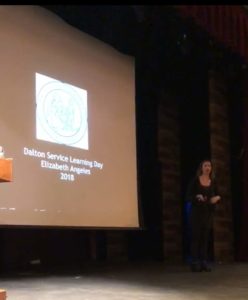 April is National Volunteer Month, and this week marks the end of National Volunteer Week.
April is National Volunteer Month, and this week marks the end of National Volunteer Week.
With most of the world experiencing the impacts of the COVID-19 global pandemic, many people have stepped up to support those in need by volunteering. Efforts include virtual phone banking to check up on neighbors, or remind people to complete the 2020 Census. Volunteers have also been critical for food distribution at a time when folks who rely on senior centers, and schools for meals, are in need.
Two years ago, I was invited to speak to students at the Dalton School to close out National Volunteer Week, and launch their day of service as a keynote speaker. At the time, it had been seven months since the impact of Hurricane Maria in Puerto Rico. I highlighted the impacts of the hurricane, but also the lingering effects of the loss of power, the lack of access to healthcare, and the additional impacts beyond the hurricane itself; Many schools were closing, suicide rates had doubled, and the need for trauma and mental health supports were evident. I wanted to show the students that even during “non-emergency times,” when media attention and political pressures fade away, service, civic engagement, and volunteerism, remain critical.
As I reflect on this, I consider the effects of the global crisis we are currently facing: What needs will we be experiencing seven months from now, and more importantly, what can we do about it?
While there is currently a focus on food access, education continuity, and addressing the immediate health emergency, I have been thinking about the emerging needs of young people. In a few days, I am excited to be participating in a virtual Career Day for high school students in Washington Heights, where I will find myself in front of students once again. I am mindful of the graduating seniors in high school who are thinking about their futures at a time when there is so much uncertainty in this transitional point in their lives, but also in the world.
Access to mentors, socio-emotional support, and work-based learning opportunities (e.g. virtual internships) will become crucial to preparing students for this new era of work.
Supports and accesss to opportunities have always been important, and they will become increasingly key to addressing the inequities that will be amplified as a result of this crisis. My hope is that we can all support the needs of students in some way, whether that be volunteering time to connect with students, or helping shape policies that wil allow them to thrive in the next phase of their lives and beyond.
One of the biggest career lessons I have learned thus far has been that the jobs and roles we play at specific organizations will change, and in some cases may not be in our control, but our work will forever be ours. And that is true, no matter what title people have at the moment, including the title of “volunteer.”
